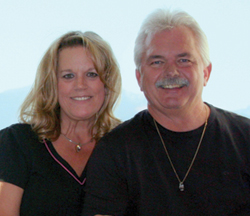Getting Information, Influencing Decisions, and Taking Away Pressure

Many QUEST readers have asked us to include women’s experiences during their partners’ diagnoses and treatment for prostate cancer. This issue, we start that topic and will continue to print stories in future issues.
Deb Kolden couldn’t believe what her fiancé was telling her.
“They’re going to take out my prostate next week,” John Litten told her in a phone call from the local urologist.
And he was ready to act on the recommendation.
Relationship
Litten and Kolden have a shared-city engagement. Until they get married this year, she lives and works in Grand Forks, North Dakota and Litten runs his business in Sitka, Alaska.
Litten was one of those men who couldn’t remember when he went for a physical, certainly at least five years, if not more, before his diagnosis.
He had been having blood pressure problems and Kolden arranged – with some persistence involved – for him to see her doctor in Grand Forks.
In the DRE, during that physical, she felt a lump on Litten’s prostate and sent him to a urologist. The diagnosis and treatment recommendation came shortly after.
Getting Information
Although Litten is 6o years old and Kolden 50, they knew little about prostate cancer or anyone who had it. Later, Litten found out that he did know men who had been treated, but they had never talked about it.
Kolden, a dental hygienist, insisted Litten not make any decisions until she did some homework.
That evening she was on the internet, reading article after article about PSA, prostate cancer and treatments.
“As much I like Grand Forks, I did not want John to have the surgery done by the urologist at our local hospital. Sixty was too young to live with the potential side effects from a less experienced surgeon. And we were in the planning stages for our marriage and new life together,” Kolden said.
While she was searching for information, she found blogs where men talked about their experiences with prostate cancer and Dr. Catalona’s name kept coming up as a recommended surgeon.
“I gave my research information to John; we watched Dr. Catalona’s video together; and immediately, I told him we should have Dr. Catalona do the operation.”
Second Guessing
Litten, meanwhile, read about possible side effects from a radical prostatectomy and decided he wanted proton treatments.
Kolden showed him the encouraging statistics of Dr. Catalona’s patients, told him that after ten years of being single, she knew he was the man of her dreams and she wanted him to be with her for a long lifetime.
“Proton treatments which direct radiation to parts of the prostate don’t necessarily get all the cancer,” she told him.
But he wouldn’t listen. And she realized that as much as she wanted him to do what she wanted, the decision was his. She couldn’t convince him that being cancer free was the one factor to consider over all others.
“Thank goodness new studies came out showing proton therapy wasn’t as effective as it should be and, using the new information, his insurance wouldn’t cover the treatments. The day the proton coverage was rejected, we put in a call to Dr. Catalona. From that conversation on, we knew we were in the right hands,” Kolden said.
Making the Decision


And from that call on, Kolden decided she didn’t want Litten to think about anything except getting well.
“We got the new patient packet from Dr. Catalona, and I highlighted the important parts and wrote notes on the side for John. I was with him all the time in Chicago. After surgery, when John was scheduled to fly back to Grand Forks; I arranged for the wheelchair, got all the necessary supplies for home and made sure the house was ready for him,” Kolden said.
The most difficult times for Kolden were not during the operation or after.
“It was hearing the diagnosis of cancer for someone I loved and wanted to spend the rest of my life with, staying focused on what to do, and then having John disagree with me over his choice of treatment. Once we met Dr. Catalona, I was totally reassured.”
Kolden and Litten knew what a good choice they made when the post operation pathology report came back. Litten’s Gleason score was 9, not the 7 from the biopsy pathology.
Kolden was relieved when Dr. Catalona told her that he was able to remove the cancer with clear margins and preserve the nerves.
Then, Litten was one of the fortunate men who was continent immediately after the catheter was removed. Now, he is using injection therapy to regain potency and feels confident that it’s going to work.
“Certainly, I wouldn’t wish this experience on anyone, but John and I are even closer than we were before the diagnosis, and we know we can work through anything together,” Kolden said.
And she added, “John’s blood pressure is totally under control now that he’s seeing my doctor!”
If your spouse or partner is a patient of Dr. Catalona and you have an experience or perspective you would like to share, please send your contact information to urf@drcatalona.com or leave a phone message at 314 725-7747 and indicate your interest.











